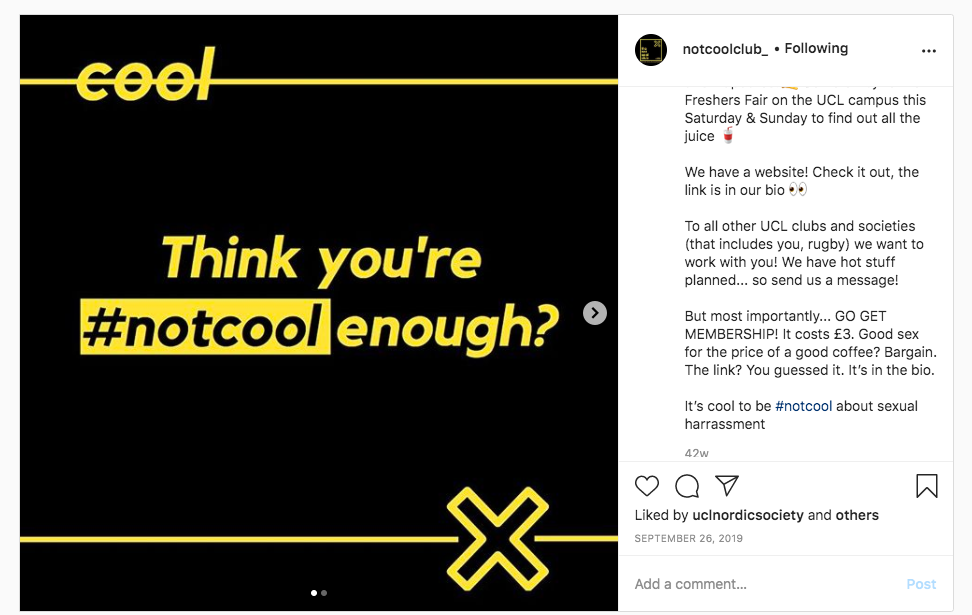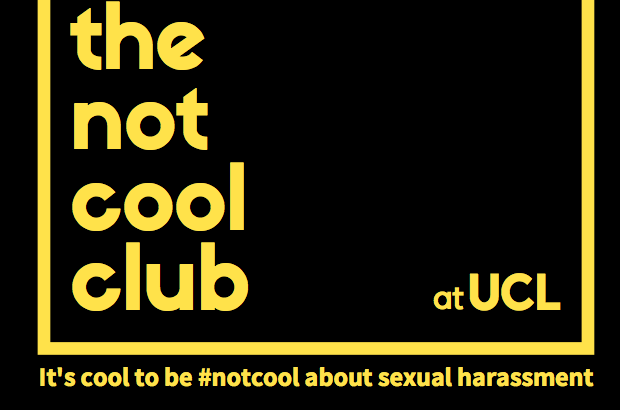NIFF O’NEILL & MILLIE KHANGURE outline their opinions on the shortfalls of the Not Cool Club.
The Not Cool Club was founded last year as a student-led society striving to tackle sexual harassment on campus. They seemingly aim to promote confidence in students and call out peers’ behaviour in order to make sexual harassment ‘not cool’. Whilst obviously well-intentioned, the Not Cool Club appears to be missing some crucial elements in their image. Firstly, the voices of those who have been sexually harassed, but also the voices of those (both men and women) who have done – and continue to do – some incredible work to combat sexual harassment.
Ian, the founder, claims his reasons behind starting the club were rooted in an experience he had whilst travelling in India, when he came face to face with child trafficking. Ignoring the influence of a complex array of cultural factors, he misguidedly then applies this experience to campus life. It is difficult to see how this origin story relates to the club’s focus, as what Ian observed in India differs vastly from the kinds of sexual harassment and microaggressions occurring on university campuses. A further problem with the inception of the club is its apparent dismissal of the #MeToo movement. They state on their website, ‘Inspired by #MeToo, we noticed the majority of engagement with this topic was coming from the victims themselves’. Despite this, the society infers that this was not enough to end sexual misconduct ‘once and for all’, and that ‘only’ their techniques would ‘be able to put an end to sexual harassment’. Undermining the success of the #MeToo movement in this way is incredibly problematic. It recasts a powerful campaign as something both unsuccessful and ineffective.
Boasting the transformative powers of the ‘Not Cool Sessions’, the infamously disbanded UCL men’s rugby team appeared in the BBC segment on the Not Cool Club which was then highlighted on their social media. We can’t help but question the motives of the rugby team members, with one interviewee stating their reason for partaking in the session as, ‘[making] a conscious effort to change that kinda perception like around the whole rugby club thing, and particularly around sexual harassment [sic]’. Does this mean that they are simply trying to improve the image of their team, after being infamously disaffiliated from the UCL sports union for sexist and racist chants on a night out, amongst other sexual harassment claims? Emphasising the conversation within groups of men and advertising the sessions as a space for men to reform their own image eclipses the experience of first-hand trauma, and potentially does more harm than good if they do not learn anything valuable from the sessions but go away convinced that they have. Furthermore, by promoting the men’s rugby club on their social media, the Not Cool Club both reinforces and perpetuates a dominant male narrative of what is socially acceptable behaviour. It appears that the Not Cool Club’s mentality is that men only listen to other men. This attitude is flawed as it doesn’t allow space for change within existing patriarchal structures.
From the inception of the club, intersectionality did not seem to be one of their core values and is exhibited very little on their social media. There is also a limited visibility of LGBTQI+ issues within the campaign, strengthening a cis- and hetero-normative binary of perpetrators and victims – a narrow-minded approach to say the least. The club notably fails to address and represent POC voices as effectively as it could. Women of colour suffer even higher rates of sexual harassment and violence due to systemic racism, yet the club appears silent on such matters. One UCLove contributor shared their grievances on the topic, saying ‘The club’s website cites the #MeToo movement as its inspiration, but nowhere does it credit Tarana Burke and the other incredible black women who laboured and persevered to ensure that the voices of black victims of sexual violence were heard. The Not Cool Club took this movement and framed it through its own lens which, consciously or not, is white-centric. It whitewashes the efforts of the black women behind #MeToo and is problematic in this way.’ This issue was further identified by a female person of colour who trained as a herd member. She told us that the herd is made up of ‘mostly white women’, and the training sessions fail to focus on specifics within sexual misconduct, placing everything under the umbrella of ‘sexual harassment’. She states there were ‘just loads of avenues which were ignored’. One example she gives is the club’s failure to address how women of colour and members of the LGBTQI + community are disproportionately affected by sexual harassment. She ‘didn’t once hear anything about race as a factor, or gender identity and differences as a cisgender person’.
Their ‘Herd Guide’, serving to brief members on how to run the Not Cool Sessions, is very vague, failing to address the specifics of sexual harassment, and neglecting to even mention the word ‘rape’ outside of referring to the Rape Crisis Organisation. The guide simplistically states that sex is the ‘crux of what [they] are talking about here’ and that we need to become cool ‘talking about it, shouting about it, and being cool with it!’. Yet, by skirting around the components of consensual sex, and failing to use the word rape, they themselves, paradoxically, are not addressing ‘the elephant in the room’.
If the narrative focused more on talking explicitly about all forms of sexual assault – ranging from microaggressions to rape – then it would initiate some very uncomfortable conversations about contemporary sexual culture. The hyper-focus on club events on their social media draws attention away from the cause. It overshadows the tackling of systemic sexual inequalities and patriarchal norms that are particularly emphasised in the university education system. This then leads to sexual harassment on campus. The club needs to address, not only how one can prevent sexual harassment in the future, but also should include accountability of one’s past behaviours, in order to be self-reflective on one’s role of the perpetuation of sexual harassment. This would uneasily contrast the light-hearted nature of the brand. Although it is clear that their social media is utilised to create hype, they frequently post content without sensitivity and consideration of the topic at hand. Tactless comments are often made such as, ‘GO GET MEMBERSHIP! It costs £3. Good sex for the price of a good coffee? Bargain.’. What constitutes ‘good sex’? Not being sexually assaulted?

Despite our critique of the club, it is necessary to give praise where it is due. The events held have managed to raise large amounts of money for various charities: notably £560 for Solace Women’s Aid, a fantastic charity that aims to support and protect women and children’s lives from domestic and sexual violence. Furthermore, the club’s flagship programme called the ‘Not Cool Sessions’ appears very promising. These peer-led talks, conducted by trained students and delivered to UCL societies have the potential to instigate real change. We need to ask though, what makes the Not Cool Club the most effective crusader in ‘ending sexual harassment once and for all’, over other existing UCL campaigns?
According to the Not Cool Club website, their mission is to address sexual misconduct, ‘whether it’s that comment your mate makes at the pub that takes things a little too far, or something more serious’. What does this mean, ‘something more serious’? Preluding a hasty 130-word mission statement on how to tackle an age-old, institutionalised culture of sexual harassment, the club page announces ‘Consent is cool – sexual harassment is not.’ If you don’t have consent, you’re not just uncool. According to the European Court of Human Rights, you’re a rapist. The discourse focuses on a simplistic and reductive message, veiled behind the repetitive dichotomy of ‘cool’ and ‘not cool’. A final year English student articulated this to us, ‘I think the branding of it as “not cool” is offensive to anyone who has actually experienced sexual harassment or assault; it is deeply more than just “not cool” and the club riffs off this slogan because it sounds conciliatory, but in a condescending way that comes from a place of ignorance rather than experience’. Furthermore, in their Herd Guide, there is a section emphasising this puzzling obsession with coolness, which states: ‘Seriously. If you’re not cool, then this ship won’t float. If your audience sees what we are doing as cool, they will latch on, and join us. If they don’t, they’ll switch off. So seriously, stay the cool cats we know you to be!’.
Sexual harassment is not a light-hearted conversation when sexual misconduct at universities is rife: over half of students have experienced advances and assault to varying degrees. Last year Cambridge University was put in the spotlight when rape and sexual assault reports from university students rose tenfold over the course of two years. Remember the boys on the outrageous University of Warwick WhatsApp group that proclaimed ‘sometimes it’s fun to just go wild and rape 100 girls’… or maybe ‘rape [a] whole flat to teach them all a lesson’? In which case, the Not Cool Club would be correct in its ambition to initiate dialogue amongst men to create socio-cultural change amongst peers, particularly as the legal system consistently fails women. However, rape, assault, and consistent derogatory sexist comments are an inherent part of both campus and clubbing culture, as well as society at large. By calling out the perpetrators as simply ‘not cool’, instead of strongly challenging their behaviour, the club undermines the collective experience of victims. A final year politics student told us, ‘As someone with the trauma of sexual assault and harassment as an ongoing reality for me, getting a message from a club member to tell me to come to a Not Cool Club event because it would “mean a lot to him” and because I could “get my face on telly” just confirmed my worries about the club. Rather than being a space where I felt my experiences could be heard and action could be taken in response, it felt like I had to dampen my experiences so they were less traumatic to fit with simply being “not cool”’. Why should women continuously mould their experiences to fit in with how men can handle and respond to it best? Men need to understand the reality of harassment and trauma by doing precisely the opposite of what Not Cool Club is doing; listening and validating the traumatic experiences of their female and queer peers.’
The Not Cool Club is a seemingly innocuous project to help recognise and address the problem of sexual harassment on campus and in clubbing culture. The campaign has been let down by problematic statements, and the tendency to sideline victims’ voices and reduce a very complex problem down to a simplistic dichotomy. Their social media presence seems to be used predominantly to advertise nights out rather than to share resources on sexual harassment, assault or rape. Considering the aim to ‘end sexual harassment once and for all’, you would expect to see these resources driving their social media presence. Although the society aims to open up the conversation on sexual harassment to all, based on reports by those who have attended the Not Cool Sessions, a more intersectional group of voices must be engaged to create a more inclusive experience. Men can help navigate other men through the conversation, but this needs to focus on how systemic sexual misconduct is made possible by ‘lad culture’, toxic masculinity, queerphobia and racial prejudice. Victim narratives must remain at the centre of the movement and be the ones directing the dialogue.
Featured image source: notcoolclub.co.uk





